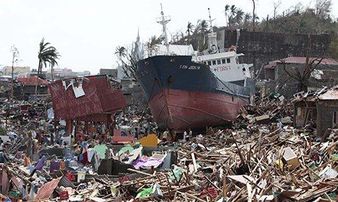 Loss and damage highlighted on the first day at UN Climate Talks Tim Dobermann, Healthy Planet COP19 delegation "I will voluntarily refrain from eating food during this COP until a meaningful outcome is in sight,” announced the Philippine lead negotiator Yeb Sano today. This was in the opening session of the 19th Conference of the Parties (COP19) to the United Nations Framework Convention on Climate Change (UNFCCC) in Warsaw, Poland. Typhoon Haiyan, the strongest typhoon on modern record, slammed into the Philippines and much of South-East Asia late last week. So far, anestimated 10,000 have died, but it is likely that the final toll will increase as the Philippines cleans up the destruction left in the typhoon’s wake. In the opening session, Mr. Sano gave a passionate plea for us to “open our eyes to the stark realities we face” and to come together to make significant progress on a global deal covering mitigation, adaptation and finance for developing countries. Devastating storms like this are becoming more common. We cannot attribute a given extreme event to climate change with certainty, but they form part of along-term trend of more severe storms, heatwaves, floods and forest fires, and are consistent with the IPCC's predictions.
On the other hand, many developed countries are worried that loss and damage payments could easily spiral out of control, and that they may weaken incentives for countries to invest in adaptation efforts. Both are probably correct. Loss and damage – an issue that has only very recently emerged on the negotiating scene – will require an international body to determine the extent of losses as well as to spread reparation responsibilities in an equitable manner.
Much of this year’s climate negotiations will be focused on establishing the framework for a post-2015 deal, designed to be agreed upon when countries meet in 2015 in Paris. In this sense, there may not be many ‘big outcomes’ from the negotiations. However, given recent events and a considerable degree of attention, there is potential to make rapid progress on loss and damage over the next two weeks. Having been fortunate to call the Philippines home for 16 years, it truly saddens me to see this continual suffering. Mr. Sano fully embraces his role not only as a diplomat or a proud Filipino, but as a representative for all of those on this planet who will directly feel the effects of climate change. The human cost of climate change is real, and it has never been clearer. It is a shame that we are in a situation where Mr. Sano needs to resort to a hunger strike to communicate the seriousness of these issues. All of society – NGOs, governments, the public – must take this message and respond. I hope that we will remember these next two weeks as the time when a brave man took a stand, to which we, finally, responded.
0 Comments
Your comment will be posted after it is approved.
Leave a Reply. |
Details
Archives
February 2019
Tags
All
|
 RSS Feed
RSS Feed
